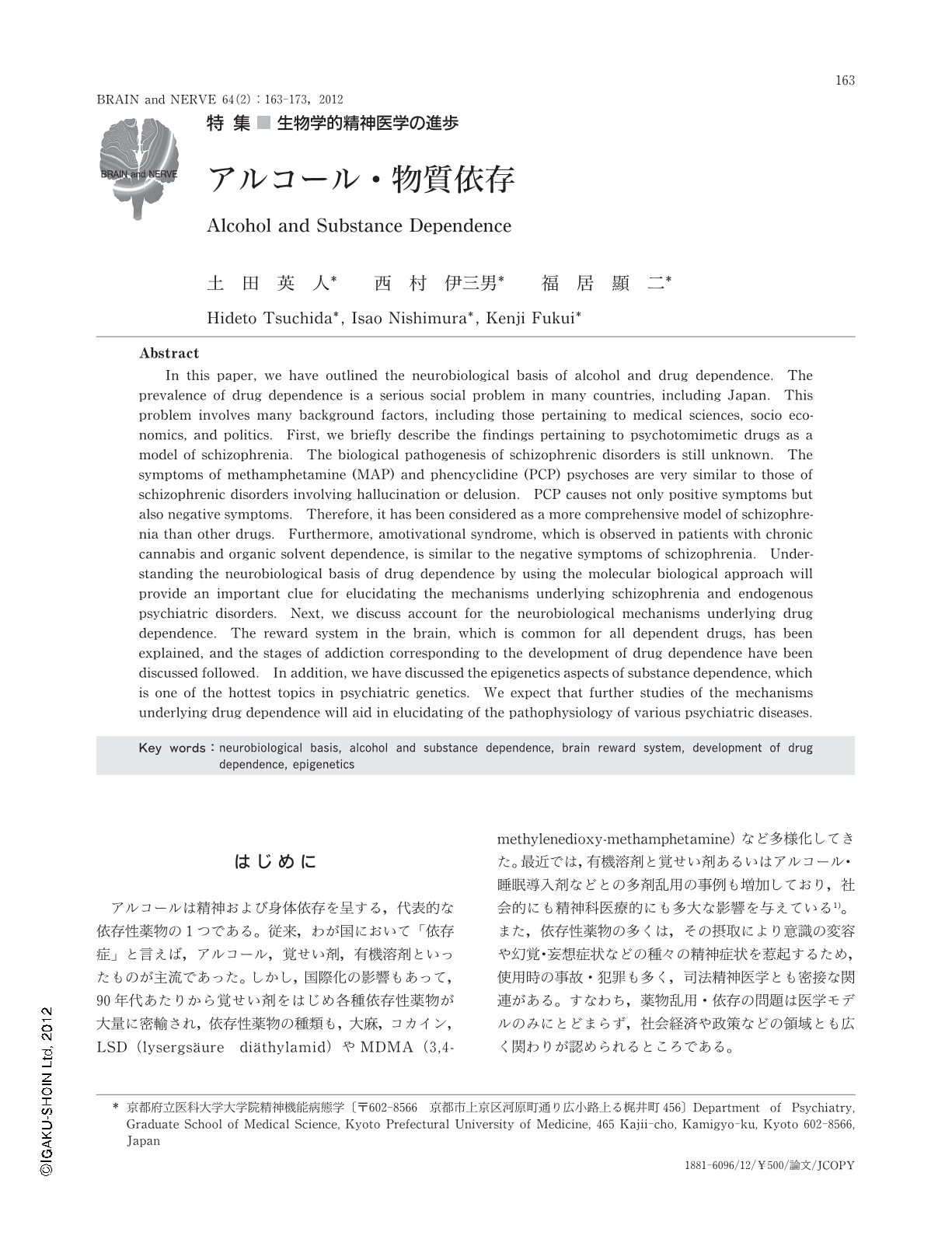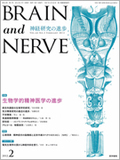Japanese
English
- 有料閲覧
- Abstract 文献概要
- 1ページ目 Look Inside
- 参考文献 Reference
はじめに
アルコールは精神および身体依存を呈する,代表的な依存性薬物の1つである。従来,わが国において「依存症」と言えば,アルコール,覚せい剤,有機溶剤といったものが主流であった。しかし,国際化の影響もあって,90年代あたりから覚せい剤をはじめ各種依存性薬物が大量に密輸され,依存性薬物の種類も,大麻,コカイン,LSD(lysergsäure diäthylamid)やMDMA(3,4-methylenedioxy-methamphetamine)など多様化してきた。最近では,有機溶剤と覚せい剤あるいはアルコール・睡眠導入剤などとの多剤乱用の事例も増加しており,社会的にも精神科医療的にも多大な影響を与えている1)。また,依存性薬物の多くは,その摂取により意識の変容や幻覚・妄想症状などの種々の精神症状を惹起するため,使用時の事故・犯罪も多く,司法精神医学とも密接な関連がある。すなわち,薬物乱用・依存の問題は医学モデルのみにとどまらず,社会経済や政策などの領域とも広く関わりが認められるところである。
近年,依存性薬物に共通の精神依存のメカニズムや,依存性薬物の長期使用によって脳内に器質的変化をもたらす神経毒性のメカニズムも検索されてきたが,いまだ十分とは言えない。薬物依存の予防および治療においてそのメカニズムを探索し解明することは,個人のみならず社会においても非常に重要な課題である。
また,幻覚・妄想を中心とする精神症状が,統合失調症などの精神疾患と依存性薬物に共通してみられることから,依存性薬物投与モデル動物を用いた症状メカニズムの解析が精神疾患の病態解明につながると期待されている。例えば,覚せい剤を摂取した時にみられる幻聴や被害妄想は統合失調症の陽性症状と酷似している。動物においては,移所運動や常同行動などの異常行動や興奮状態を惹起させ,また覚せい剤の反復投与による逆耐性現象やドパミン受容体遮断作用を持つ抗精神病薬による拮抗作用も明らかとなり,陽性症状を主体とする統合失調症の病態モデルとしての位置づけがなされてきた。また,フェンサイクリジン(phencyclidine:PCP)は,幻覚・妄想といった陽性症状のみならず自閉や感情の平板化といった陰性症状もみられることから,より包括的な統合失調症モデルと考えられている。このことからCarlssonらは,線条体におけるドパミン-グルタミン酸の不均衡が統合失調症の生物学的成因の1つではないかとの仮説を提唱している2)。すなわち,皮質(グルタミン酸)-線条体(gamma-aminobutyric acid:GABA)-視床(グルタミン酸)-皮質のフィードバックループを想定し,このループと黒質線条体ドパミン系との相互作用により陽性症状あるいは陰性症状が発現することが推定され,現在もその検証が進められている。さらに,統合失調症類似の病態を示す薬物は覚せい剤やPCPばかりではない。マリファナの長期摂取や有機溶剤乱用により生じる動因喪失症候群は,脳器質性障害の後遺障害や統合失調症の陰性症状に類似しており,これらの病態にある共通した責任部位ないしメカニズムが考えられる。
本稿では,薬物依存形成メカニズムにおける共通の基盤の1つである脳内報酬系と,分子レベルでみた依存形成過程のメカニズムについて概説し,さらに最近のエピジェネティクスに関する研究について主にコカインとアルコールで得られた知見を中心に紹介したい。
Abstract
In this paper,we have outlined the neurobiological basis of alcohol and drug dependence. The prevalence of drug dependence is a serious social problem in many countries,including Japan. This problem involves many background factors,including those pertaining to medical sciences,socio economics,and politics. First,we briefly describe the findings pertaining to psychotomimetic drugs as a model of schizophrenia. The biological pathogenesis of schizophrenic disorders is still unknown. The symptoms of methamphetamine (MAP) and phencyclidine (PCP) psychoses are very similar to those of schizophrenic disorders involving hallucination or delusion. PCP causes not only positive symptoms but also negative symptoms. Therefore,it has been considered as a more comprehensive model of schizophrenia than other drugs. Furthermore,amotivational syndrome,which is observed in patients with chronic cannabis and organic solvent dependence,is similar to the negative symptoms of schizophrenia. Understanding the neurobiological basis of drug dependence by using the molecular biological approach will provide an important clue for elucidating the mechanisms underlying schizophrenia and endogenous psychiatric disorders. Next,we discuss account for the neurobiological mechanisms underlying drug dependence. The reward system in the brain,which is common for all dependent drugs,has been explained,and the stages of addiction corresponding to the development of drug dependence have been discussed followed. In addition,we have discussed the epigenetics aspects of substance dependence,which is one of the hottest topics in psychiatric genetics. We expect that further studies of the mechanisms underlying drug dependence will aid in elucidating of the pathophysiology of various psychiatric diseases.

Copyright © 2012, Igaku-Shoin Ltd. All rights reserved.


